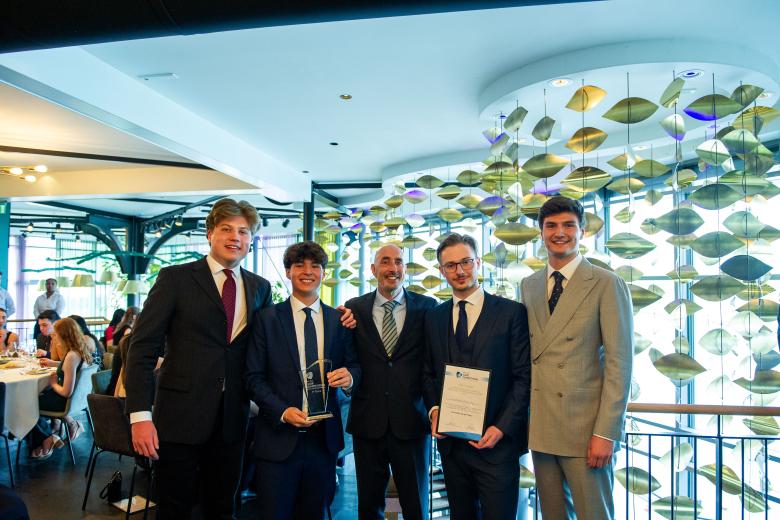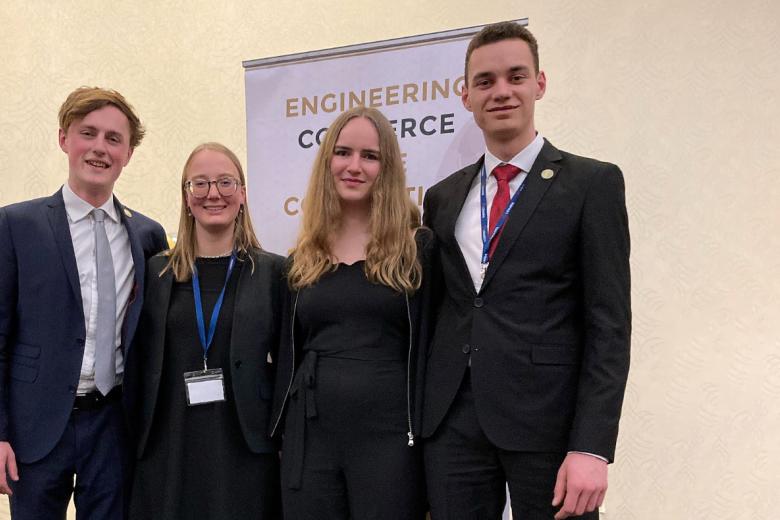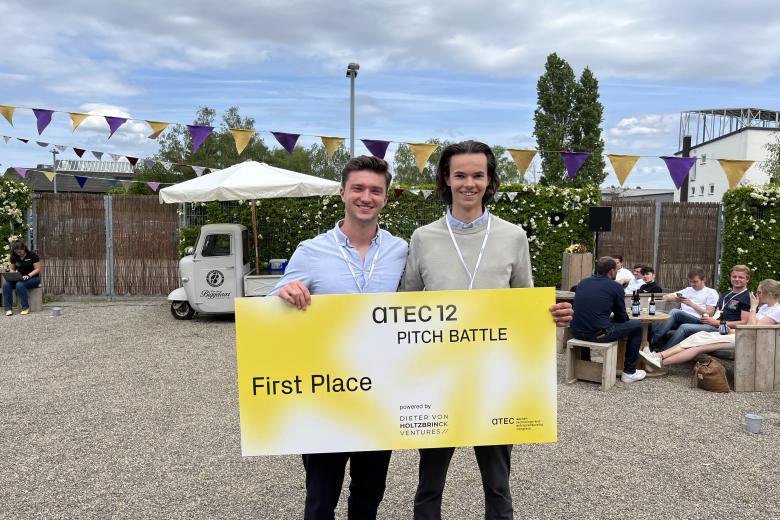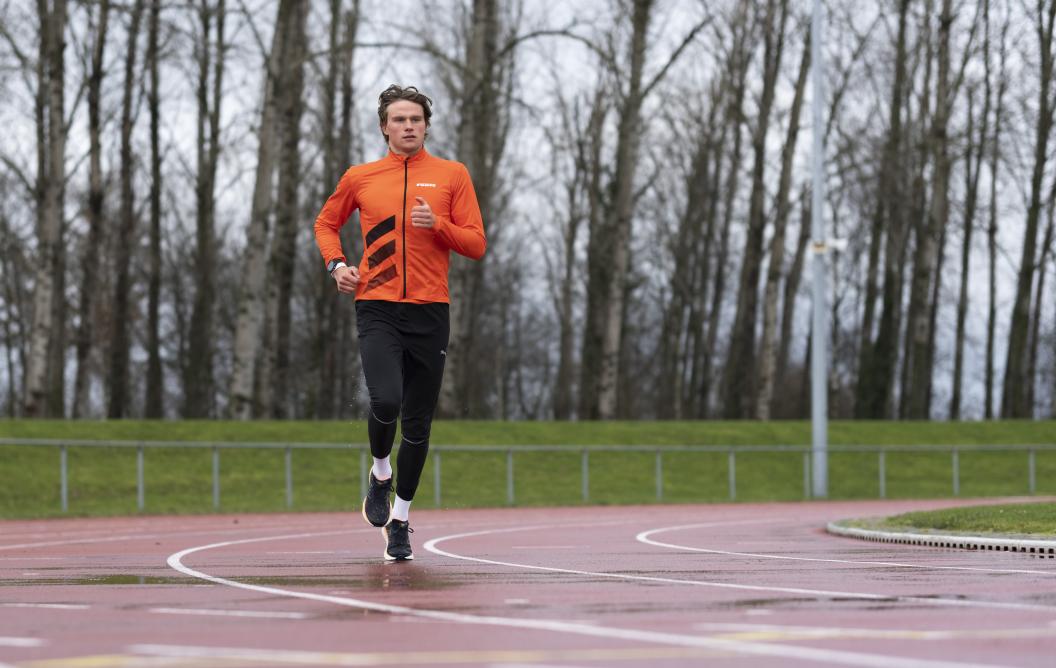Top sport alongside study - triathlete Hidde Mollee
They go places, our UM top athletes. When I approached Hidde Mollee (19) at the beginning of this year for an interview, he very kindly asked if that was possible after February. He was in Namibia that whole month for an altitude internship. How do you do that alongside your bachelor's degree in International Business, going abroad for a whole month? And why an altitude internship for a triathlete?
Hidde has the official NOC-NSF status of International Talent and is therefore an exceptional talent with international potential in triathlon. He was even scouted for this sport. How did that come about? "I played football, judo and athletics until I was 14. So I started running early on, but also cycling. My entire family cycles and when we went on holiday, we always took my small race bike with us so we could go cycling all together. Triathlon came my way at 14 when we did cooper tests in high school to test endurance. Because of my sports background, I did quite well in those tests and at the end of that day I got a wildcard to participate in an NOC-NSF Talent Day. There, athletes get together and you are placed in a certain profile, e.g. tall and strong, or endurance. I ended up in the latter profile. We did all types of tests, our body measurements were measured, they estimated our fitness, etc. After that talent day, I was approached by the triathlon federation asking if I wanted to join a training day sometime. Since then, I have been doing nothing but triathlon. I think it's a great sport!"
Namibia
Last triathlon season, Hidde raced at the World Junior Championships in Montreal. And now? "Last year I was a junior and competed at the European and World Junior Championships. This year, I enter the 'under 23' category and am preparing for the new season. I have already made my competition schedule for the rest of the year, so I more or less know what is coming up." Why did you and the selection go to Namibia for training? "Windhoek, the place where we were in Namibia, is at 1,700 metres altitude. That altitude has a positive effect on training. This is because at altitude, there is less oxygen and after training at altitude for a while, your body adapts to that lack of oxygen. It then starts producing extra red blood cells. That adaptation of the body takes quite a long time, which is why we stayed there for a month. When you finally return to sea level, you still benefit from that altitude because your body is used to training, resting, and recovering with less oxygen. So your physical condition gets a boost and that works positively for the next training block." After that month at altitude, doesn't the body also go back to normal physical condition within a month? "Eventually your body goes back to the normal amount of red blood cells, because the body notices that it is no longer at altitude and no longer needs those extra red blood cells. But your body doesn't do that right away, so you have a period after that altitude training where you can train incredibly well and really can lift yourself to the next level."
Sittard
There is no doubt that his sport comes first. "I am originally from Haarlem and moved to Sittard a year and a half ago. I had earlier received the invitation to come to the national selection training centre in Sittard, but I wanted to finish my secondary school at home first. I had long planned to fully focus on sport in a gap year after graduation. In that gap year, when I had been living in Sittard for about a year, I decided to do an education alongside my sport. I moved to Limburg especially for my sport, so sport is really number one for me. However, I definitely do not consider my education unimportant, because I also want to develop academically." Does it work out with the schedule, daily hours of sports and also teaching groups and studying? "I make active use of the top sports programme, especially the possibility of scheduling your own teaching groups. Of course, I also have fixed training times here in Sittard with the group and I can then try to fit those in as best as possible. If I were to miss an exam, but that hasn't happened yet, I would certainly also take the opportunity to do the resit. Still, it remains difficult from time to time. For instance, I would go to a training camp in Portugal during exam period 5. So did some other students in my triathlon group. Unfortunately, we couldn't go because there was no other option for the exams of that period. It would be great if, for example, there could be a dual course, so sport and study combined. That would provide even more flexibility."
Choices
Hidde's goal is to earn his income from triathlon full-time and professionally. But a master's degree first, right? "I want to see if the bachelor's will work alongside my sport. I would also like to do a master's degree, but that is not very realistic at the moment. Maybe doing a master's after my top sports career, that's very possible." Do you like living in Sittard? "I live there in a kind of top sports park with all athletes, not only from the triathlon association, but also cyclists, footballers, mountain bikers, handball players, etc. All people with the same outlook on life. So your sports life also becomes your social life. A night of heavy drinking is not in the cards for us. But that's a choice, and choices are part of life."
By: Margot Krijnen
Photography: Joris Hilterman
Also read
-
SBE students triumph in international case competition at Rotterdam
SBE took first place in the Rotterdam School of Management Star Case Competition (RSMCC). The competition welcomed 16 top-level international business teams of four students, who were tasked with tackling two real-life business cases.
-
Students of Business Engineering harvest international awards
A group of Maastricht University's Business Engineering Bachelor's students won three awards at this year's edition of the renowned ENGCOMM, the Engineering and Commerce Case Competition, held by the University of Concordia in Montreal (Canada).
-

